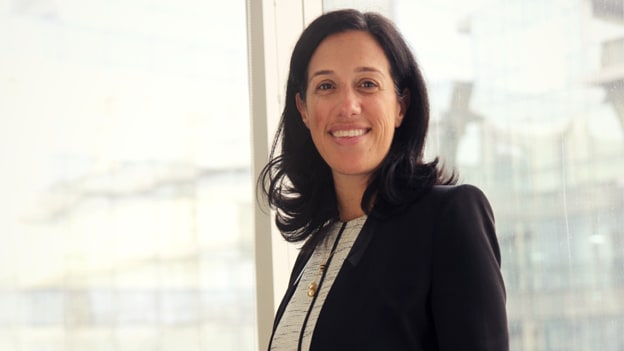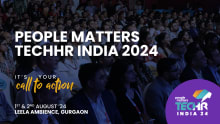Future of work is the biggest HR challenge: Deloitte's Erica Volini

Erica Volini is the US Human Capital leader for Deloitte Consulting. In this role, she is responsible for the 4,000+ practitioners focused on helping organizations solve their most complex and pressing Human Capital issues. Throughout her 20 years of career, Erica has worked with leading organizations across multiple sectors and geographies and is a frequent speaker on how market trends are impacting the HR organization and profession as a whole. Within Deloitte, she serves as a member of Deloitte Consulting’s Management Committee and Board of Directors.
You've had extensive experience in consulting, and now you are involved in expanding Deloitte’s HR product portfolio. Tell us about how your career journey has evolved over the years.
I actually wanted to be a lawyer which is a far cry from the world of HR, but the first consulting project I worked on was for a publishing company. This was when I realized the power of workforce in achieving the company’s value and strategy. At that time, HR outsourcing was a big thing, and I spent my early years focused on helping organizations outsource their HR services. But it became clear that HR couldn’t just ship off their responsibilities to another vendor, and if they did, they weren’t going to be able to create the employee experience that they needed to attain the top talent. From there, I started getting into a lot of strategy work, helping HR functions develop their strategy and implement it. This is what has led me to where I am right now.
In terms of products, although Deloitte will always be a services company, over time our clients were asking us to come up with pre-built solutions to accelerate what they are trying to do in the market. And so, it opened up the door for us to say to look at our IP and say “What if we took that IP and started to make it into solutions and products that we can offer to our clients to supplement our services?” Once we provide these services, how do we support them on an ongoing basis? So we just don’t develop a strategy but implement it. It’s about providing sustainable solutions to our clients that will help them to continue to evolve.
You have actively worked on digital transformation agendas. What according to you is at the core of digital transformation? What should HR leaders need to know before embarking on this journey?
The most important thing is to know that becoming digital is as much about the technology as it is about the change in the mindset. In order to become digital, you fundamentally have to change your culture. And being digital could mean different things to companies, but at its core, it means being more adaptable and flexible, driving increased collaboration, learning how to fail fast so that you can continue to innovate and a lot of the organizations don’t have it internalized in their DNA.
The role of HR is – One, understanding what your digital culture means on key attributes. Then figure out what areas you need to build. For example, if you need to build more collaboration, how are you going to promote collaboration? Should you change your organizational structure? Should you put it new technologies like social and collaboration tools that allow people to communicate across the matrix? That’s the role HR should play in driving that cultural change and helping to bring that digital mindset for the organization.
Deloitte’s human capital trends report talks about the rise of the “network of teams”. What is this concept and why does the future of work depend on it?
The network of teams at its core is about getting people together across various parts of the organization to work towards a single goal. It could be getting a product out the door, driving innovation or expanding to a new market. But the idea is that you are leveraging talent from all different parts of the hierarchy, and those individuals need to accomplish those goals.
Every company has different kinds of teams, and we are finding that more work is getting done in teams. However, the challenge with a team-based culture is in finding the best leaders in those teams. It is different from the traditional succession planning process because you are not necessarily moving up the hierarchy. So it becomes imperative to find out the natural leaders in the organization, who are at the center of most of the communication and who have an influence on others. It is about using such people to then create and drive networks of teams that will help shift the culture.
In one of your blog posts, you mention that “Achieving success is one thing, but sustaining it–especially in our ever-evolving world – that’s quite another.” What is sustainable HR all about?
Today’s world is being disrupted rapidly, and that’s not going change. If we have learned anything, it is that the pace of change will continue to increase. When we talk about sustainability, it’s about how you understand the trends that are happening. How are you continually evolving your processes and technology? Because technology solutions are changing every year and there are a number of new technologies and vendors each year.
So being sustainable could mean putting in place a Collaboration-oriented architecture (COA) that continuously monitor the technology market to help you understand what new technologies are coming and how to make that selection. Being sustainable in HR could mean having access to research that is providing you with real-time research data and analytics to help you continue to evolve your process and programs. It means keeping a pulse on what your employees are thinking and feeling every day so you could understand whether preferences are changing or evolved. What CHROs need to understand is that you can’t continually evolve if you are only looking at your four walls. You need to have the ecosystem that will tell you what is going in your external environment.
A Deloitte study reveals that about 90 percent of business leaders feel that the human resource function is struggling to keep up with technological process change. Do you think HR has fallen behind tech adoption?
I think it’s the opposite. I think HR was historically behind, but when you think about the adoption of Cloud services, HR was the first function to migrate to the Cloud before finance or supply chain. What we find is that the HR organizations may have implemented technology, but they haven’t quite figured out how to change their processes and people, and make sure that they are also changing alongside the technology. And that’s what’s really completes the transformation. It should be about transforming the way you do the work, bringing design thinking so that your processes are focused on the employee and figuring out what new services you can provide.
What according to you is the most complex and pressing problem in terms of human capital management today?
The biggest issue is the future of work. It is the single biggest challenge from the human capital standpoint. I think there are two major factors impacting work — one is Automation, whether that’s products, cognitive tech or AI; and the other part is the new talent models emerging with contingent labor. The future of work is really about figuring out how tasks can be done differently and then using that opportunity to think about how you can enhance the processes in a different way. So if you’re going to automate one task, and you create capacity for the workforce to do other things, should they be focused on creating a better customer experience instead of doing a task where automation can really improve the efficiency? And once you create those new tasks, what type of people you need to execute those tasks? What skills and competencies do they need? How should they be structured? How should they be rewarded? How should their performance be managed? How could you leverage new talent models like contracts, the gig economy, and the Cloud? So, it really starts to change and challenge all fundamentals of the way HR has set things up because now we are looking at all those things through a new lens, the future of the way work is getting done, so it’s incredibly exciting.








